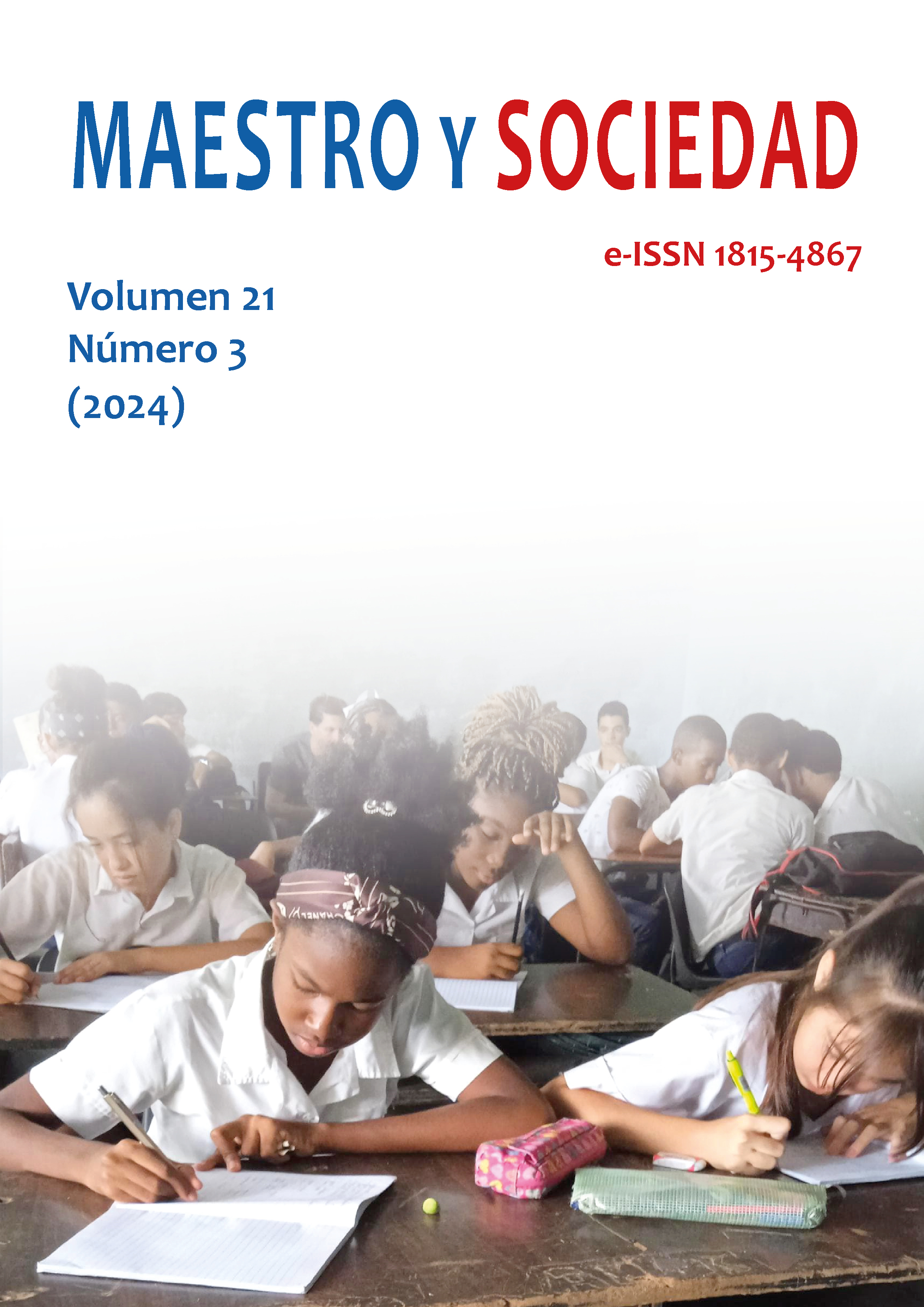Educational Guidance Strategies to Increase Interest in Learning among High School Students
Keywords:
Educational guidance strategies, student motivation, learning, teacher trainingAbstract
Introduction: When students are motivated, they participate more actively, show greater persistence in the face of challenges and develop deeper and more lasting learning. Studying students' lack of interest in learning is essential to improve their academic performance and personal development. Materials and methods: This article is a study of educational guidance strategies in motivation and interest through a mixed and non-experimental methodological design in high school students of the "San José" Private Mixed Educational Unit, in the Quevedo canton. . Information was collected through surveys (quantitative) with students and interviews (qualitative) with teachers of the institution. Results: The results show the importance of carrying out an initial diagnosis of needs, involving all actors, establishing evaluation and constant feedback mechanisms, using attractive teaching resources and having trained counselors. Student surveys show a positive attitude toward learning, motivation for tasks, and enthusiasm for the topics covered in class. Discussion: The findings suggest that educational guidance strategies can have a significant impact on increasing high school students' interest and motivation towards learning. Several teachers agree on the importance of having highly trained counselors or facilitators with adequate skills to implement these strategies effectively. Conclusions: Students perceive support from classmates and teachers, as well as effective teaching methods. However, some students do not find usefulness in the feedback received, as challenges were also found, such as adapting to the individual needs of students and managing limited resources, highlighting the need for a continuous approach in the training of teaching staff. and collaboration between all educational actors.
References
Alcaraz Andreu, C. (2009). Motivación y Edad: Dos factores clave en el aprendizaje de la expresión oral. Las destrezas orales en la enseñanza del español L2-LE, 205-2016.
Azorín, C. (2018). El método de aprendizaje cooperativo y su aplicación en las aulas. Perfiles educativos, 40(161).
Banoy Suárez, W. (2020). Clase invertida: nuevas tendencias en educación medidas por tecnología. Bogotá: Corporación Universitaria Minuto de Dios.
Barrios-Tao, H. (2016). Neurociencias, educación y entorno sociocultural. Educación y Educadores, 19(3), 395-415.
Bausela Herreras, E. (2004). Modelos de orientación e intervención psicopedagógica; modelo de intervención por programas. eduPsykhé, 3(2), 201-216.
Bisquerra, R. y Álvarez, M. (1996). Modelos de intervención en orientación. (331-351). Manual de orientación y tutoría. Barcelona: Praxis.
Bravo-Chavarría , N. ., y Jama-Zambrano, V. (2022). El interés en el aprendizaje del nivel cognoscitivo en los estudiantes. 593 Digital Publisher CEIT, 7(4-2), 231-243. https://doi.org/10.33386/593dp.2022.4-2.1230
Canabal, C., y Margalef, L. (2017). La retroalimentación: la clave para una evaluación orientada al aprendizaje. Profesorado, Revista de curriculum y formación del profesorado, 21(2), 149-170.
Carrillo, M., Padilla, J., Rosero , T., y Villagómez, M. s. (2009). La motivacion y el aprendizaje . ALTERIDAD Revista de educacion , 20-32.
Covarrubias-Apablaza, C., Acosta-Antognoni, H., y Mendoza-Lira, M. (2019). Relación de Autorregulación del Aprendizaje y Autoeficacia General con las Metas Académicas de Estudiantes Universitarios. Formación universitaria, 12(6), 103-114. https://doi.org/http://dx.doi.org/10.4067/S0718-50062019000600103
Crispín, M. L. (2011). Aprendizaje autónomo : orientaciones para la docencia. Universidad Iberoamericana.
Echeverría, R., y Martínez, R. (2015). La familia como contexto de aprendizaje y desarrollo: Implicaciones para la orientación educativa. Revista Iberoamericana de Educación, 69(1), 1-16.
Escribano Hervis, E. (2018). El desempeño del docente como factor asociado a la calidad educativa en América Latina. Revista Educación, 42(2), 1-25. https://doi.org/10.15517/revedu.v42i2.27033
Gonzáles, A., Rodríguez, A., y Hernández, D. (2011). El concepto zona de desarrollo próximo y su manifestación en la educación médica superior cubana. Educación Médica Superior, 25(4).
González-Benito, A. (2018). Revisión teórica de los modelos de orientación educativa. RECIE. Revista Caribeña De Investigación Educativa, 2(2), 43-60. 10.32541/recie.2018.v2i2
Molina Contreras, D. L. (2004). Concepto de orientación educativa: diversidad y aproximación. Revista Iberoamericana De Educación,, 1-22. https://doi.org/10.35362/rie3512924
Naranjo, M. (2009). Motivación: perspectivas teóricas y algunas consideraciones de su importancia en el ámbito educativo. Revista Educación, 33(2), 153-170. https://doi.org/https://doi.org/10.15517/revedu.v33i2.51
Paredes Vásquez, H. (2021). Orientación educativa: estrategias psicopedagógicas para el desarrollo de la autoestima en el estudiantes. Ciencia Latina Revista Científica Multidisciplinar, 5366-5382.
Rodríguez, Z. Y., Sanz, M., y Berenguer, M. (2012). La motivación en el proceso de enseñanza-aprendizaje. Revista Digita EFDEP, 17(170).
Rodríguez Vite, H. (2014). Ambientes de aprendizaje. Ciencia Huasteca Boletín Científico De La Escuela Superior De Huejutla, 2(4). https://doi.org/10.29057/esh.v2i4.1069
Sierra, J., Bueno, I., y Monroy, S. (2016). Análisis del uso de las tecnologías TIC por parte de los docentes de las Instituciones educativas de la ciudad de Riohacha. Omnia, 22(2).
Stover, J., Bruno, F., y Uriel, F. (2017). Teoría de la Autodeterminación: una revisión teórica. Perspectivas en Psicología: Revista de Psicología y Ciencias Afines, 14(2), 105-115.
Vergara, C. (2019). La teoría del Condicionamiento operante de BF Skinner.
Venet Muñoz, Regina, y Delisle Sesé, Marlene. (2023). La formación del docente en Orientación Educativa. Problemas, tendencias y pertinencia. Varona. Revista Científico Metodológica, (76).
Published
How to Cite
Issue
Section
License
Copyright (c) 2024 Kenia Rosselin Carmigniani Molina, Regina Venet Muñoz

This work is licensed under a Creative Commons Attribution-NonCommercial-NoDerivatives 4.0 International License.
This journal provides immediate open access to its content, based on the principle that offering the public free access to research helps a greater global exchange of knowledge. Each author is responsible for the content of each of their articles.



























 Universidad de Oriente
Universidad de Oriente 